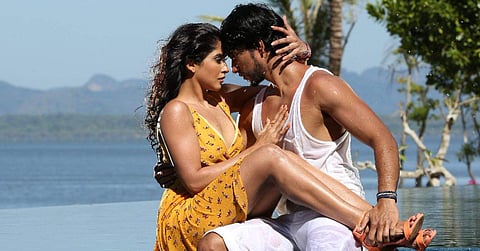

In a recent interview with us, Karthik had expressed some surprise over how mimicry artistes imitated him. “Do I really talk like that?” he had asked us. In his latest film, Mr. Chandramouli, it almost feels like he’s trying to mimic those very artistes. It’s every cliché associated with his performances. The infantilism, the devil-may-care optimism, the hurried speech, the stammers… The infantilism of his character, in particular, is quite romanticised in the film. In a sense, Chandramouli is what you’d get if you infected an elderly character with the ‘loosu ponnu’ syndrome of our cinema. He’s chirpily hopping around, making bad jokes in the trademark sing-song manner of speech we have come to associate with the actor. In one scene when Chandramouli and son, Raghav (Gautham Karthik), are in a restaurant with a visiting card on the table, the former quips, “Dosai nu nenachu visiting card-a saapturaadha.” Raghav’s look is priceless. In another scene, Raghav calls him with a career crisis, and Chandramouli’s response is ill-fitting, infantile optimism. Raghav, who realises this is the best he can get from his father, goes straight to his girlfriend with the same concern. Later, in an interesting flashback, you learn about a surprise, secret relationship between the elderly Chandramouli and a younger woman (Varalaxmi Sarathkumar, who I really liked in the part). While I liked the idea – and the unceremoniousness of it all – I never quite did understand what that woman saw in this man. What was she getting in this man that she wasn’t getting in others? In what feels like a cursory explanation, she says he reminds her of her father, and says, “But ungala appa nu koopda maaten.” Freud would have had a field day with this relationship.
Director: Thiru
Cast: Gautham Karthik, Karthik, Regina Cassandra, Mahendran
Mr. Chandramouli is actually conceived as a thriller, but there’s so much bloat around it that when the film finally starts to mean business in the second half, it’s almost too late. A large part of the opening portion concerns the mandatory love story of Raghav… with Madhu (Regina Cassandra), who he falls for when he sees her for the first time. Madhu abuses him for the ogling, and Chandramouli asks his son why he doesn’t respond in kind. Raghav’s response is the sort of ingrained sexism we often think we have weeded out from Tamil cinema: “Once we get married, there’s plenty of time for that.” Meanwhile, Madhu inexplicably returns to him when he doesn’t pursue her anymore – and pursue, in these films, is usually done in the literal sense. She asks, “If you can’t beg and fight for your love, how will you have time to cherish me when we are together?” This is when I knew both characters deserved each other. This line leads to a song shot at an exotic beach, in which Gautham Karthik performs some admirable slo-mo acrobatics. In the sort of hard-hitting thriller, Thiru must have wanted to make when coming up with the script of Mr. Chandramouli, these sequences are criminal.
It may be badly written – and I’d guess that much of it is done with an eye on the box office – but you can see Thiru has lots of ideas. He makes Raghav a boxer, only so the fight sequences can seem believable. The whole call taxi crime angle is interesting, even if it feels repetitive and simplistic in the film. The flashback relationship of Chandramouli is an interesting idea, but again, sans emotional detail, it feels perfunctory. And much like in his last film, Naan Sigappu Manithan, here too the protagonist gets afflicted with a strange disorder that’s designed to make the final fight sequences absorbing. I also like that Thiru was able to convince an actor into playing a red herring. There are a lot of interesting ideas, but in union, they fail to whip up the commercial storm, the director must have intended. Sometimes, just sometimes, I think films would be all the better for writers worrying just about the story, and not the reception.